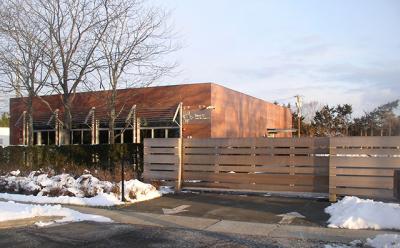Hedge Funder’s Gate Not ‘Friendly’

Steven A. Cohen, the well-known hedge fund manager and owner of two estate properties here, established a successor fund to his SAC Capital Advisors in 2014 after SAC was fined $1.8 billion for insider trading, and set up offices for the new fund, Point72 Asset Management, in Stamford, Conn.; New York City, Hong Kong, Tokyo, Singapore, London — and now East Hampton.
Mr. Cohen, whose old firm was under legal scrutiny for many years by both the United States Justice Department and the Securities and Exchange Commission, is now taking on another governmental agency: the East Hampton Town Planning Board. He has built a gated fence in front of his new branch office, at 203 Pantigo Road in East Hampton, the former Wei Fun restaurant, that has raised the eyebrows of several planning board members.
The offending structure is a six-foot-tall chain link fence with a cedar facade. It was built without site plan approval.
“Character is very important to this town,” Nancy Keeshan told her fellow board members, and Alexander Baranovich, an architect who is representing Mr. Cohen, on Feb. 9. The gate, she said, “is not friendly” to the rural character of Pantigo Road.
“The town has always avoided having gated communities. Generally speaking, we like to keep things open,” Job Potter said. “I think it is pretty unusual to have a commercial site with a gated parking lot. The question is why?”
Mr. Baranovich, who never identified his client by name, answered by focusing mainly on parking. In the summer, overflow traffic from neighboring restaurants and delicatessens like Goldberg’s Famous Bagels was “a little bit out of control,” he said.
Mr. Cohen, whom Forbes magazine called “one of the most successful hedge fund managers ever,” paid $3.3 million for the slightly less than half-acre site on Jan. 20, 2015. According to a memorandum by Eric Schantz of the Planning Department, the property is zoned for neighborhood business and was most recently occupied by a restaurant. It has since been converted into an office for Mr. Cohen, which is allowed under the zoning code.
Besides the appearance of the gate, Marguerite Wolffsohn, who heads the Planning Department, faulted the size of its opening. “Every access driveway on nonresidential properties shall have a minimum unobstructed width of 20 feet,” she read from the zoning code. That regulation, Ms. Wolffsohn said, cannot be waived.
The gate’s opening is only 14 feet. Mr. Baranovich acknowledged that it would have to be reconstructed.
In addition, it was clear that the fence had been built right over a handicapped parking access space. Patti Leber, a member of the board, had gone to the site and taken some photos.
While Mr. Baranovich stressed that the use of the site was low intensity, Ms. Wolffson was more concerned with its future. She asked board members that whatever they determine will stay with the building in perpetuity, no matter who may come to own it.
Mr. Baranovich touched on two topics besides parking that likely are important to his client. The interior of the office building, following its conversion from the restaurant use, includes an office for a representative of the S.E.C., in accordance with a final agreement reached last month between Mr. Cohen and the regulatory agency.
Mr. Cohen, while not admitting guilt, was barred from trading with other people’s money for two years, and SAC Capital is in the process of closing down. Point72 Assets Management proclaims that it is “a family office managing the assets of its founder, Steven A. Cohen, and eligible employees.” Mr. Baranovich suggested that Mr. Cohen may be a bit “paranoid” at this point about outsiders.
Planning board members agreed that a public hearing should be held before the proposed site plan can be approved. A hearing will be scheduled after Mr. Baranovich submits a revised plan.
